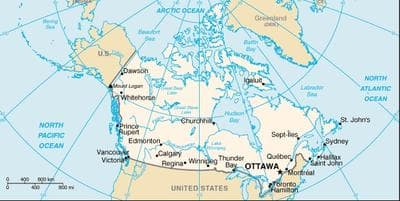Advertisement
Study: Canada Points Way To Saving Medicare

Plenty of rhetoric this election season has warned that Medicare, the government health coverage for seniors, will go bankrupt in a few years. (CNN does an excellent fact-check of those claims here.)
What is to be done? The candidates propose differing remedies, but a research letter just out in The Archives of Internal Medicine analyzed decades of Medicare data and offers a persuasive case for an alternative solution: Do as the Canadians do.
It estimates that if the United States Medicare system were more like Canada's, we could have saved more than $2 trillion since 1980. Instead, our Medicare spending on seniors has grown at almost triple the rate of Canada's.

The authors, Dr. David U. Himmelstein and Dr. Steffie Woolhandler, are professors at the City University of New York’s School of Public Health and visiting professors at Harvard Medical School. They are also co-founders of Physicians for a National Health Program and prominent advocates for a single-payer system in the United States. From the press release:
After adjusting for inflation, the authors found U.S. Medicare spending per elderly enrollee rose 198.7 percent from 1980 through 2009. In Canada, the comparable figure was 73 percent.
According to the authors, the findings have important implications for the debate on how to save Medicare. “Had U.S. Medicare spending per elderly enrollee increased as slowly as in Canada, the savings from 1980 through 2009 would have totaled $2.156 trillion,” said Himmelstein. “That’s equivalent to more than one-sixth of the U.S. national debt.”
The new findings appear today in the Archives of Internal Medicine, a leading medical journal published by the American Medical Association. The article, which takes the form of a research letter, includes supplementary analyses based on less detailed data showing that the U.S. could have reaped even larger savings – nearly $3 trillion – from 1971 to 2009.
The article cites several reasons for Canada’s better record on cost containment: Less paperwork and administrative bloat throughout their health system (administrative costs account for 16.7 percent of total health spending vs. 31 percent in the U.S.); the use of lump-sum budgets for hospitals; stringent controls on spending for new buildings and expensive new equipment; the use of single-buyer purchasing power to rein in drug and device prices; relatively low litigation and malpractice costs; and an emphasis on primary care.
Woolhandler commented: “In a nutshell, including the elderly in a universal, nonprofit, publicly administered single-payer system has been the key to Canada’s cost control. Although U.S. Medicare is often called a single-payer system, that’s not quite accurate. It’s true that traditional Medicare is relatively efficient – only about 2 percent of its budget goes to administration, according the most recent trustees’ report, versus about 14 percent for privately run Medicare managed-care plans – but Medicare is only one of many health care payers in the United States.
“As a result,” Woolhandler said, “doctors’ and hospitals’ administrative costs are inflated by having to deal with a multitude of payers and by having to track eligibility, attribute costs and bill for individual services. This extra paperwork and bureaucracy is a major contributor to rising costs in the U.S., and these costs spill over into the relatively efficient Medicare program.
“In contrast, Canada’s single-payer system is much more streamlined and lean throughout, with big dividends for clinical care.”
The press release connects the political dots a bit:
The article notes that some U.S. politicians advocate replacing traditional Medicare with vouchers that seniors could use to buy private coverage. Still others advocate offering incentives for health providers to limit care. Yet none of these proposals have proven themselves to be effective in containing costs, the authors write.
“Canada’s road-tested cost containment methods offer an alternative,” they say.
I asked Drs. Himmelstein and Woolhandler if they could relate their findings even more directly to the impending election. They replied that in their view, the Romney/Ryan ticket would be much worse for Medicare and the seniors who depend on it:
U.S. Medicare cost growth has exceeded Canadian Medicare cost growth for most of the past 40 years. This has been true under Republican administrations as well as Democratic ones. The only two slowdowns in U.S. Medicare cost growth occured during wage and price controls in the early 1970's and for a few years after passage of the Balanced Budget Act of 1998 at the end of the Clinton Administration.
Despite the fact that Medicare costs have grown under both Republican and Democratic administrations, it's clear that a Romney-Ryan victory would further fuel the Medicare cost crisis. Romney and Ryan are committed to accelerating the privatization of Medicare — although it is well known that private plans (also known as Medicare Advantage or Medicare HMOs) raise costs to Medicare. A senior who enrolls in a Medicare HMO cost the taxpayers 25% more in 2012 than that senior would have cost had he/she been enrolled in traditional Medicare. This overpayment is due to Medicare HMOs' cherry-picking, a Congressionally-mandated overpayment to Medicare HMOs initiated by the Medicare Modernization Act of 2003, and a longstanding subsidy related to Medicare HMO enrollees receiving about 3% of their care at VA hospitals.
One of the few real cost control measures in the 2010 Affordable Care Act (ACA) was a reduction in Medicare's overpayment to these private plans. For instance, Medicare's overpayment to private plans in 2009 (just prior to passage of the ACA) was a whopping 32%. The ACA's cut to the Medicare HMO overpayment makes up almost a third of the $715 billion dollar Medicare savings contained in the ACA, savings provisions that Romney-Ryan have attacked and said they would repeal. So Romney and Ryan have told us that they would 1) push even more seniors into private plans, and 2) repeal the measures in the ACA that were meant to bring payments to private plans in line with costs in traditional Medicare. It's clear that when in comes to the Medicare cost crisis, a Romney/Ryan victory would make a bad situation worse.
Quite apart from these changes, which would drive up the total costs of caring for senior citizens, a Romney/Ryan victory would worsen the affordability of health care by making seniors pay a higher share of these total costs, and by reducing federal support for Medicaid (much of which goes to provide supplemental coverage to impoverished seniors).
Readers? Reactions?
This program aired on October 30, 2012. The audio for this program is not available.
